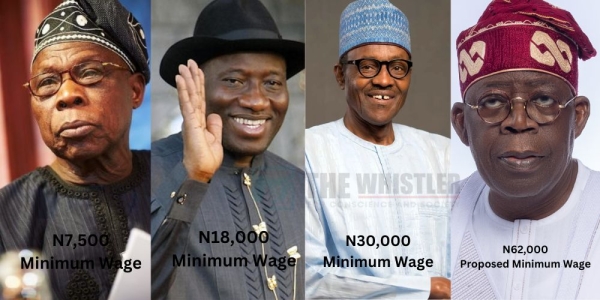After several days of deliberations, the Nigerian government and Organised Private Sector (OPS) jointly proposed N62,000 as minimum wage raising the amount from the N60,000 earlier proposed.
But an analysis conducted by THE WHISTLER has shown that the amount is far less valuable than the N7,500 minimum wage of 2000, N18,000 wage of 2011 and N30,000 wage of 2019.
Since the removal of fuel subsidy in 2023 and the introduction of a managed float of the naira which now trades at N1485.8 at the official market from N462 per dollar in 2023, the cost of living has spiked beyond the reach of most Nigerians.
Inflation has risen from 22.41 per cent when the administration took over office in May 2023 to 33.69 per cent in April 2024.
Since 1999, the Nigerian government has paid N7,500 as minimum wage which was later reviewed to N18,000 in 2011 and N30,000 in 2015.
But currency depreciation, inflation, and high cost of living have, overtime eroded the value of wages.
N7,500 minimum wage in 2000 VS N62,000 In 2024
The Nigerian government led by former president Olusegun Obasanjo paid N7,500 minimum wage in 2000 and at the time, the exchange rate was N91.83 per dollar according to data from the Central Bank of Nigeria.
Based on the time value of money, the N7,500 minimum wage was equivalent to $81.67 in 2000. Compared with the current CBN exchange rate, the proposed N62,000 minimum wage is valued $41.7.
By implication, the N7,500 minimum wage which equals $81.67 in 2000 is worth N121,349.23 in 2024 at the prevailing exchange rate of N1,485.8 per dollar. The newly proposed minimum wage is 195.7 per cent lower than the N7,500 paid under Obasanjo.
Other Indices
Also, when comparing commodity prices, the price of a 50-kilogram bag of rice in 2000 was N2,500 which implies that N7500 wage can afford three bags of 50kg rice while N62,000 minimum wage can not afford a bag of rice that sells between N79,000 to N82,000 per 50kg bag.
In 2000 N7,500 minimum wage could buy 14 bags of cement at the price of N550 per 50kg bag while the proposed N62,000 wage can buy almost buy eight bags of cement (7.75 bags) at an average price of N8,000.
Comparing the cost of borrowing, in 2000, the CBN monetary policy rate was 11.7 per cent according to the World Bank while as of May, MPR was hiked to 26.25 per cent making it over twice more expensive to service loans.
N18,000 minimum wage in 2011 VS N62,000 In 2024
In 2011, the Goodluck Jonathan administration made an upward review of the minimum wage after 11 years from N7,500 to N18,000.
When the wage was raised to N18, 000 the exchange rate was N196.99 per dollar. At the exchange rate, the N18,000 wage was equal to $91.3 while the proposed N62,000 minimum wage is $41.7 at CBN exchange rate of N1485.8 per dollar on June 6, 2024.
Consequently, the value of the N18,000 ($91.3) minimum wage in 2024 is N135,653.5 at the current exchange rate of N1485.8 per dollar. By implication, workers are paid 218.7 per cent far less than they earned in 2011.
Other Indices
In 2011, the average price of a 50kg bag of rice was N9,000 and the N18,000 wage could afford two bags of rice while the proposed N62,000 wage can not buy a bag of rice that is sold between N79,000 to N82,000 in 2024.
Nigeria’s N18,000 minimum wage could also buy 9.23 bags of 50kg cement which was sold at N1,950 in 2011. However, the newly proposed minimum wage of N62,000 can only buy almost eight bags of cement at an average price of N8,000.
Based on interest rate, the benchmark rate of the CBN was 12.0 per cent in 2011 while the CBN has raised the rate to 26.25 as of May 2024.
N30,000 minimum wage in 2019 VS N62,000 In 2024
After the Jonathan administration ended in 2015, his successor, former president Muhammadu Buhari also approved N30,000 national minimum wage in 2019. Labour unions protested the high cost of living after inflation rose to 11.25 per cent in March 2019.
When compared with the proposed N62,000 minimum wage, THE WHISTLER found that the N30,000 wage in 2019 is 234 per cent higher.
A breakdown reveals that the exchange rate as of the time was N306.95 per dollar which means the N30,000 wage was equal to $ 97.73. Using the exchange rate of N1,485.8 per dollar, the $97.73 (N30,000 in 2019) is worth N145,215.8 in 2024.
Other Indices
Between 2019 and 2024, the price of a 50kg bag of rice surged from N24,000 to N82,000 respectively.
In 2019, the minimum wage could buy one bag of 50kg rice with N6,000 balance, but in 2024, the proposed N62,000 wage cannot buy a bag of 50kg rice.
Compared with the purchasing power of the two wages to buy 50kg bag of cement, the N30,000 minimum wage could buy 12 bags at the cost of N2,500 per bag. Meanwhile, the N62,000 wage can only buy almost eight bags of cement at an average price of N8,000.
Also, the cost of borrowing was lower in 2019. The CBN MPR was 13.5 per cent while the rate is 26.25 per cent making it more expensive to access loans and service debt.
[THE WHISTLER]


